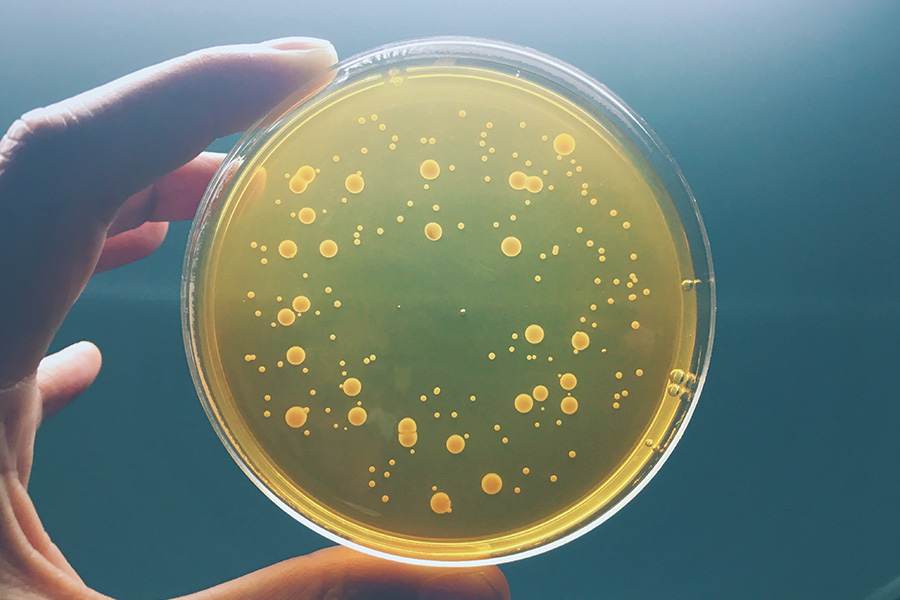In 2008, the NIH started funding the Human Microbiome Project in an effort to identify and characterize the microorganisms of the human body (such as those on the skin and in the vagina, mouth, and the intestinal tract) to determine if they play a role in human health and disease.
This research has started unraveling the relationship between the humane microbiome and our health, and has revealed that these organisms contribute to diseases, including psychological disorders.
Nervous System in the Gut
The gut has its own nervous system, known as the enteric nervous system. It is commonly referred to as “the second brain” because it contains as many neurons (50-100 million) as are present in the spinal cord. The gut is lined with endocrine cells that can release as many as 20 different hormones, which go on to affect our body and interact with our brains. The vagus nerve coordinates the information exchange between our guts and brains; it causes our brain to react when we are hungry and our stomach to react when we are upset.
The hormone serotonin, involved in creating the feeling of happiness, was a hormone once thought to be predominantly located in the brain. It was later discovered that serotonin is actually predominantly stored in the stomach. As much as 96% of the body’s serotonin is stored in the stomach, perhaps because it is synthesized from the biochemical tryptophan in our diets; diets low in tryptophan can induce the onset of depression.
The Microbes in Our Gut
One hundred trillion microorganisms live in our stomachs, and they encode 100 times more genes than humans do. They help us break down the food we eat and provide us with our vitamins and nutrients. Gut bacteria produce the neurotransmitters serotonin, GABA, dopamine, and acetylcholine, and they can also ferment dietary fiber into short-chain fatty acids with neuroactive properties. These molecules are thought to interact with our endocrine cells and stimulate the transmission of messages to our brain through our vagus nerve.
Because they can do this, researchers have proposed that gut microbes can interact with our brain and influence our eating and drinking behaviors in order to perpetuate their existence. The gut microbes can be altered by factors such as diet and probiotic/antibiotic use. Eating a diet rich in certain organisms may create a shift in the balance of microbes from one type to another.
Microbiome and Disease
A link has already been made between microorganisms in the gut and various diseases. Some microorganisms, in the presence of artificial sweeteners, can break down food more efficiently, a mechanism thought to contribute to obesity. And the pathogen Clostidium difficile causes intestinal bowel disease flares.
Persons with autism spectrum disorder are often troubled with bowel disease and digestion disorders, potentiating a link between diet and autism. Interestingly, the bacteria Bacteriodes fragilis might prevent autism disorder in the mouse model.
As mentioned previously, a diet low in tryptophan is associated with depression. The reverse, increased dietary tryptophan, might relieve depression, however, this is also dependent on microorganisms in your stomach taking in tryptophan and synthesizing serotonin from it. The bacteria species Bifidobacterium infantis may be an important factor in creating serotonin because it has been shown to reduce depression in the rat model.
The Microbiome in Alcohol Drinkers
Some people (but not all) who drink alcohol heavily have abnormal intestinal flora compositions. Pathogenic bacteria, such as the Enterobacteriaceae and Bacteroidaceae, are present in higher concentrations, and good forms, such as Lactobacillus spp., Lachnospiraceae, and Ruminococcaceae, are present in lower concentrations.
Leaky Gut
Heavy alcohol drinkers who have altered stomach bacteria also have increased permeability of the gut. Leaky gut is a problem because it leads to the release of bacteria and bacterial components into the blood stream and increased systemic inflammation. Researchers think that there might be a relationship between increased inflammation in the body and the severity of depression, anxiety, and alcohol cravings, so this topic is currently under investigation. However, symptom severity might just be a result of the bacteria and not the leakiness.
Psychological Symptoms
People who are alcohol dependent and have unhealthy stomach bacteria and high gut permeability have more trouble with their addictions than alcohol-dependent persons with normal stomach bacteria and permeability. In a recent study, people with high gut permeability had worse depression, anxiety, and alcohol cravings after withdrawal. Quitting alcohol decreased gut permeability but did not restore the gut epithelial barrier fully. During withdrawal, these people experienced a return of some of the healthy bacterial populations (Bifidobacterium spp. and Lactobacillus spp.), but not all. Healthy bacteria Faecalibacterium prausnitzii did not return by end of the study, that is, three weeks after starting withdrawal.
Can the Gut Barrier Be Restored?
Currently it is not known if an unhealthy stomach microbiome can be reversed back to healthy levels, or if all of our psychological symptoms attributed to them can disappear. Researchers have shown that the bacterial populations in our bodies are quite stable over time.
Changing your diet and taking probiotics (but not antibiotics) has the ability to change the intestinal bacteria flora contents and leakiness. Taking probiotic Lactobacillus spp. and Bifidobacterium spp. has been shown to restore the levels of these healthy bacteria and improve liver enzyme readings…the only problem is that you have to keep taking the probiotics.
Could restoring the levels of F. prausnitzii (or another microorganism) reduce anxiety or alcohol cravings? If so, how would we do this? Not all microorganisms grow in culture and can be manufactured into a supplemental tablet. If there is a way to restore other needed microorganisms, it is likely through a complete overhaul of the diet.
Sources:
Emeran Mayer. The mind-gut connection. How the hidden conversation within our bodies impacts our mood, our choices, and our overall health. New York, NY: HarperCollin Publishers, 2016.
http://www.ncbi.nlm.nih.gov/pubmed/25288760
http://www.ncbi.nlm.nih.gov/pubmed/25872593




